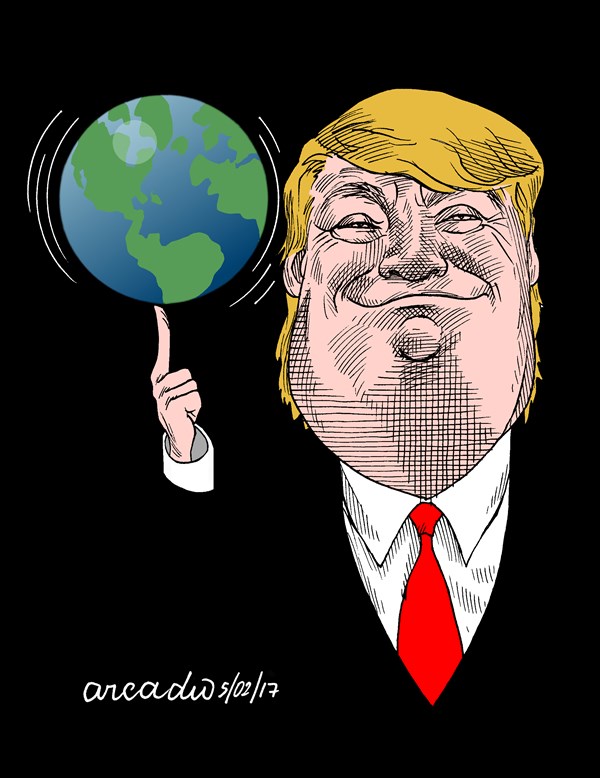
Like Trump's unorthodox diplomatic outreach to North Korea, the president's almost instant recognition of Venezuela's opposition leader as interim president was unexpected. But it holds real potential for encouraging progress in serious situations where solutions escaped other recent presidents.
Now, this won't be genuinely recognized by many in today's political and media class, whose members can't see a single Trump action meriting anything but headshaking derision.
They'll trot out the trite tropes — he's leading us into war — as they did when Trump pushed North Korea's Kim "Little Rocketman" Jong-un around verbally. The ominous presence of three U.S. carrier strike forces did encourage Kim to suspend ICBM and nuclear weapon tests. The two leaders are expected to meet again later this month.
Hugo Chavez and Nicolas Maduro have turned Venezuela into an economic sinkhole with ominous alliances with Russia, Cuba and Iran, as well as alleged links to narcotics trafficking.
Maduro is actually a former bus driver who's driven Venezuela into a crippled purgatory of crime, corruption, starvation, hyperinflation and violent protests, prompting millions to flee the country and creating a genuine South American refugee crisis.
While Washington was focused on shutdown hyperbole, the White House engineered a strikingly simple series of events: Vice President Mike Pence phones the legislature's opposition leader, Juan Guaido. The next morning, Guaido declares himself interim president. Minutes later, the Trump administration officially recognizes him.
The Republican president then calls to encourage the head of a major oil supplier who's a socialist. Trump aides say this is part of a more attentive U.S. policy toward the Americas, something previous administrations have vowed but not pursued.
Historically, the United States has been infamous throughout Latin America for often ignoring human concerns, launching tardy military interventions and supporting for its own convenience right-wing generals whose military costumes sport far more medals than buttons.
Trump's leadership includes crippling new sanctions on Venezuela's national oil company, which provides more than 80 percent of government revenues.
That's prompted several dozen other nations to follow, recognizing Guaido in a growing effort to oust Maduro and begin rebuilding Venezuela's economy that's lost half its GDP in five years.
We may never know the backchannel maneuverings and payoffs currently underway to dissolve Maduro's support within the country's military, which has been infiltrated by Cuban advisers. The American president says: "Everything's an option. I take no options off the table."
As well he should with an unstable leader and Russians hovering just 1,300 miles south of Florida. Maduro's few international supporters include China, Cuba, Iran and Russian President Vladimir Putin, who seeks naval and air bases on the U.S. southern flank.
Understandably but sadly, Americans' international interests tend to go east to Europe and west toward Japan, not south to the 33 countries of Latin America with twice the population and area of the U.S.
Even for those of us who studied that hemisphere, it can be a confusing collection of cultures, histories and politics, such that it only breaks into our national consciousness when a Venezuela erupts or 33 miners survive 69 days in a Chilean cave-in.
The United States, let's be honest, has often been something of a klutz when intervening internationally. Vietnam and the Bay of Pigs come to mind. Nobel Peace Prize winner Barack Obama did succeed in ousting Moammar Gadhafi with bombs, but created a lawless Libya instead to become terrorism's newest training ground.
From that, Obama took the wrong lesson to Syria's civil war, refusing to arm Free Syrian forces in time to possibly oust the murderous Bashir al-Assad. That forfeited influence and territory to Iran and Russia, which — oh, look! — got airbases and its navy's first warm-water port.
Likewise, Obama used an excuse to hastily withdraw U.S. troops from Iraq, leaving the land open for the bloody rise of the ISIS caliphate, just now ending after Trump's orders to annihilate it.
Trump's more muscular, assertive diplomacy will take time to acquire global credibility after years of Obama's empty words.
Of course, it has risks and no guarantees. Maduro could lash out. This White House could overstep.
However, it's encouraging that while Trump wisely keeps all options open in his public comments, his first instinct for 25 months has been escalating sanctions through international coalitions and offers of discussion.
And, the limited ISIS campaign aside, the default has not been movements by the U.S. military whose modern missions tend to creep broader and broader.
See the war in Afghanistan. That began as a revenge action to prevent more 9/11s and became an attempt to glue together a forsaken tribal land where Genghis Khan, Alexander, the Brits and Soviets had failed.
The U.S. entry was 18 years and 4,566 American lives ago.
While results in both Venezuela and North Korea are far from complete and isolation of Cuba and Nicaragua even more distant, they do display an encouraging evolution of Trump foreign policy. One sure thing, the standard diplomacy of every other recent presidency proved incapable of achieving even such tentative results.
Worse, inaction would carry more dangerous consequences and corrode the credibility of American power for coming years as the strategic and economic competitions heighten with the emerging tag-team of China and Russia.
(COMMENT, BELOW.)
Andrew Malcolm
McClatchy Washington Bureau
(TNS)
Malcolm is an author and veteran national and foreign correspondent covering politics since the 1960s.


 Contact The Editor
Contact The Editor
 Articles By This Author
Articles By This Author